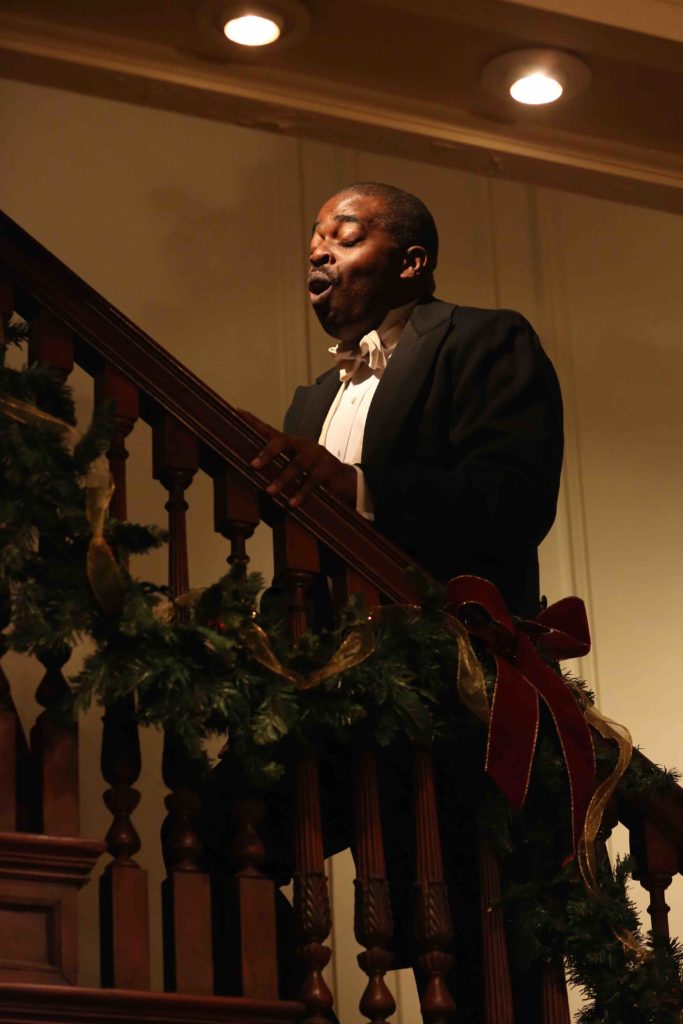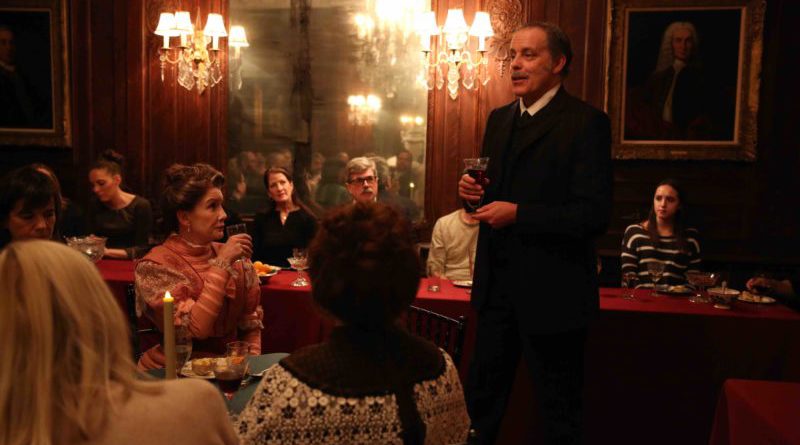INTERVIEW: Finding family in ‘The Dead, 1904’

Top photo: The Dead, 1904, adapted from the novella by James Joyce, stars Melissa Gilbert and Rufus Collins. Photo courtesy of Carol Rosegg / Provided by Matt Ross PR with permission.
The Irish Repertory Theatre’s immersive production of The Dead, 1904 continues to be a holiday delight for audience members in New York City. Now back for its third year at the American Irish Historical Society, across from the Metropolitan Museum of Art, the James Joyce adaptation features cast members preparing and eating a Christmas dinner while the audience, the invited guests for the night, take part in the festivities.
Technically the feast being celebrated is the Epiphany, which occurs Jan. 6, 1904. That means the actors are in period dress, and Dublin is going through transformation outside the humble abode.
The environs for the staging are beautifully realized; the American Irish Historical Society’s headquarters is a jaw-dropping townhouse overlooking Fifth Avenue and Central Park. Guests arrive in the lobby and ascend the staircase to a meeting hall filled with piano music, spontaneous singing, Irish jig dancing and plenty of spirits, both the heavenly and liquid kind.
Although much of the show is jovial and celebratory — including the meal of fat brown turkey, beef tenderloin, mashed potatoes, cranberry relish and bread pudding — there is a somberness that permeates the good cheer. One character, played by Melissa Gilbert (Little House on the Prairie), is mourning the loss of someone close, while another young man has difficulty watching his alcohol intake.
One of the family members at the center table is Bartell D’Arcy, played by opera singer Robert Mack. The singer-turned-actor is best known for his work with Three Mo’ Tenors and the American Spiritual Ensemble. His role in The Dead, 1904 marks his off-Broadway debut.
Mack came to the production thanks to, of all things, YouTube.
“The director, Ciarán O’Reilly, said he had heard me on a YouTube clip singing a piece,” Mack said in a recent phone interview. “I think it was ‘Make Them Hear You.’ The piece is originally from Ragtime, but the way in which I do it was written a particular way for a production I was in called Three Mo’ Tenors. … He heard it and started looking me up and found out who my agent was.”
O’Reilly and Mack had a meeting, and the actor said the conversation went extremely well. They talked about the role of Bartell and other topics, including life in general and the strange times everyone is living in right now.
“I felt a good spirit and energy with him, and I think he felt the same with me,” he said. “He gave me the script, and he said, ‘Why don’t you go home, read about the character, read the script, and take a few days and let me know if you’re interested or not.’ I took it home, I read it and, I kid you not, I was immediately interested and called my agent back.”
Mack responded to the piece because it was something new for him, perhaps a bit out of his typical wheelhouse, which involves opera. It just so happens that the character of Bartell has a particularly moving musical number during the performance; it is performed on the staircase as everyone watches from nearby.
“I come from an opera world where the focus is on singing,” he said. “Of course, in opera we do act as well, but the focus is not as much. And so I said, ‘Well, this will be my first real stage play.'”
There are some similarities between The Dead, 1904 and his previous work in opera. For starters, although the audience in the Joyce adaptation is right next to Mack during the performance — even sitting next to him at a dinner table — live theater is live theater, and that means each performance is unique and each crowd unpredictable.
“I think that’s what I love about it actually,” he said. “That’s all a part of live theater anyway, whether it be opera, any type of performance art or a stage play. Yes, you’ve got to stick to what your markings are and what you’re supposed to do and what you’re committed to, but by having a different energy in the place, it does [change] the way in which I deliver the piece each night. It really does.”
One theme for the entire two-hour performance is the power of family, and that extends to the ticket buyers as well. The gathered people are welcome guests at the dinner table (well, at least those who paid for a dinner ticket), and Mack said this family atmosphere takes place in front of everyone and also branches off to the behind-the-scenes work on the play.
“I’m one of the new cast members,” he said. “And the cast has been, for the most part, together for the last two years, but it is a family play. It starts with the company, I kid you not. It starts with the staff at the Irish Rep. It’s already a family, and so they brought me right in. They’re very kind, very welcoming.”
He added: “I was just talking to one of the cast members last night, and I was expressing to them how much I appreciate being part of the family. … Like in the beginning, when I first came to the table read and everything, I just wanted to soak in all those many years of experience that they had in acting, and they were so loving and caring for the production, the piece and had great integrity. They also wanted to give it back to me whatever it is I needed. Unfortunately during this production my brother passed away, and I had only known these people for a few weeks. And the love and support and attention I received from them was overwhelming, overwhelming. It’s a family. They’re already ready, if you will, to treat me like family, and that’s how I feel already. I think the audience gets that, and it’s authentic. It really is real. We have a good time with each other, on and off the stage.”
Each night, when Mack is preparing for the performance, he focuses on his voice, like any good opera singer would. He does some vocal warmups, and he also considers the intimate and sensitive nature of The Dead, 1904, which continues through Jan. 13. He needs to get in the right frame of mind — for singing, for acting, for sharing a dinner table with strangers, who are supposed to be family and friends.
“You’re laughing with someone who you never met before because each night to the right of me and to the left of me and in front of me actually are four people I never met, who I am, for all intents and purposes, forced to have a conversation with, but in a good way,” he said. “Sometimes the guests want to go with you, and sometimes they don’t. It depends on the energy of the person. Some people are a little afraid of immersive theater. They feel like they need to be trained. … It’s all about just being natural. Let’s sit here and have dinner and hold conversation.”
Mack knows what his fellow cast members are going to perform, and he knows his own lines. What the guests will bring to the table is a wonderful surprise. Some will dance along with the cast, and others might need to be politely ushered to the side so that the play’s dialogue can be said on cue.
So, sitting backstage, he prepares for the unpredictable, which might seem like an impossibility, but he decides to focus on some general themes that have helped his career and his life.
“You have to set your mind,” he said. “That’s really what it is for me, just setting my mind at peace and ready to receive, in love, and to give, in love. … Sometimes even when I receive a phone call from someone, and I’m not really ready to talk to that person, I say a little prayer to myself, ‘OK, Robert, receive in love and give in love.’ So that means I’m ready to receive whatever they’re going to say in a loving way and give back in a loving way. Then I’m all right. Once I set that before me, I’m all right to move ahead.”
Apparently there’s much life in The Dead, 1904.
By John Soltes / Publisher / John@HollywoodSoapbox.com
The Dead, 1904 continues through Jan. 13 at the American Irish Historical Society on Fifth Avenue in New York City. The Irish Repertory Theatre production is directed by Ciarán O’Reilly and based on James Joyce’s novella. Click here for more information and tickets.

